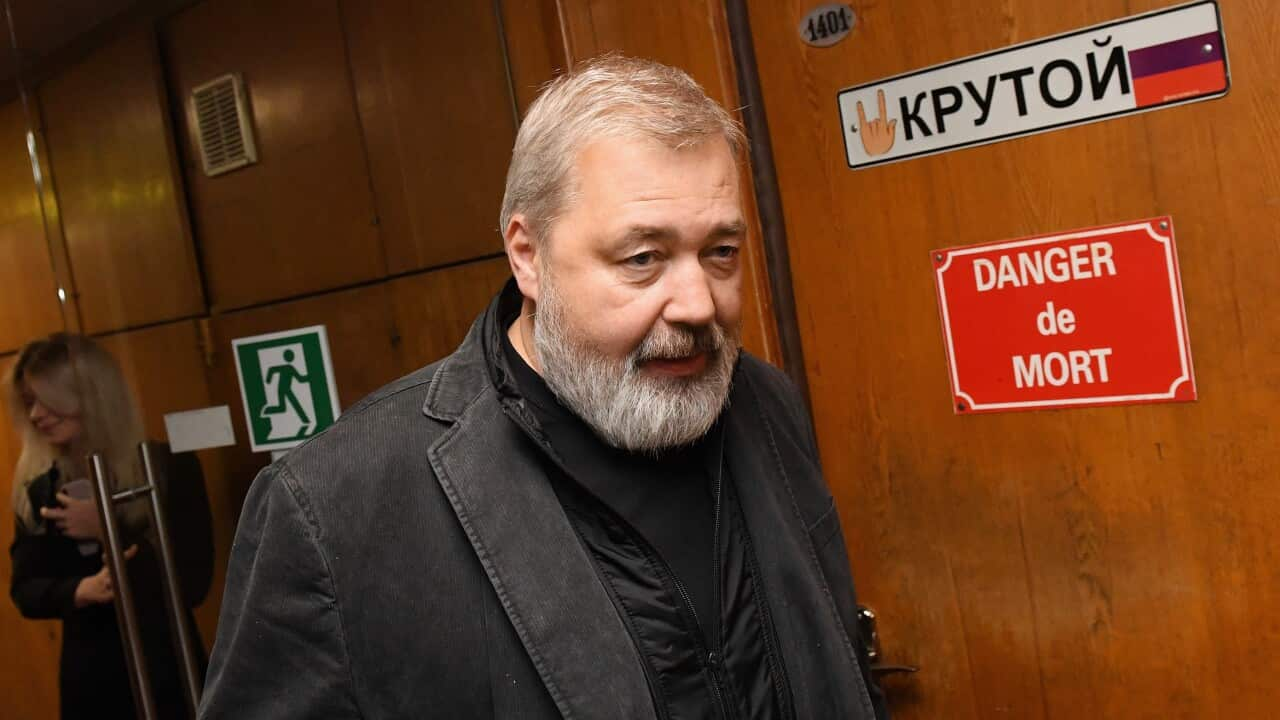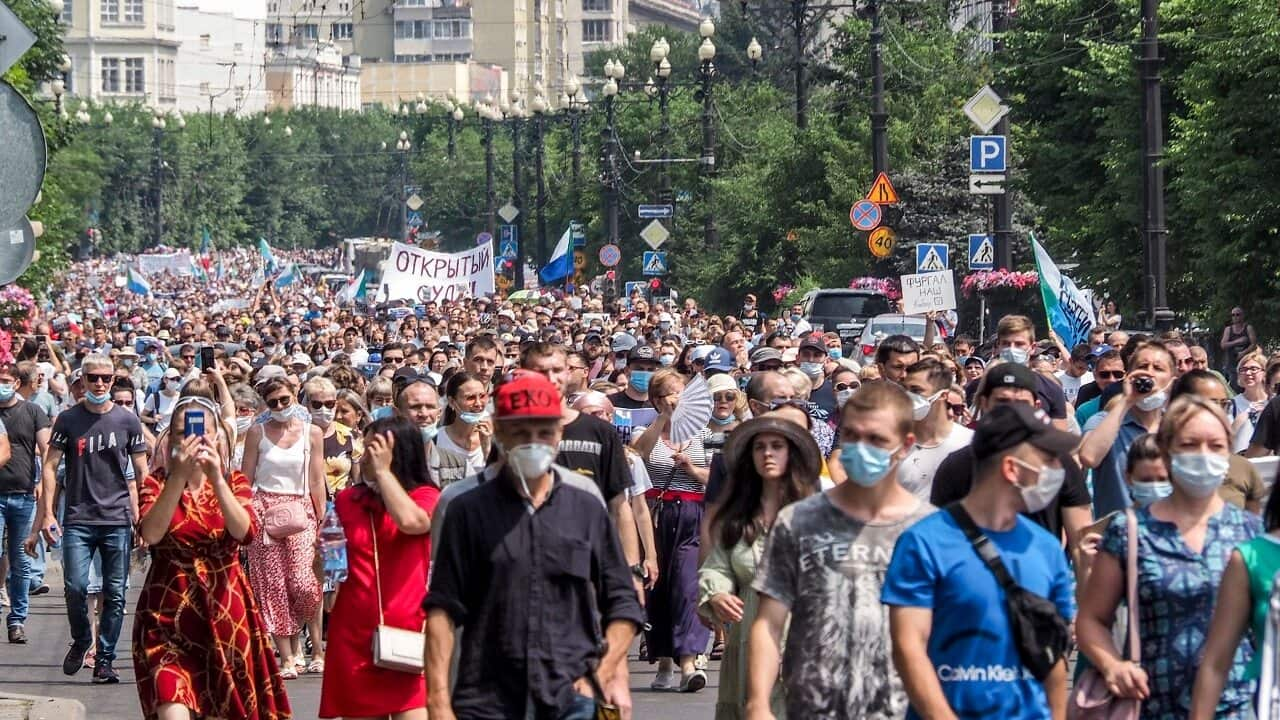Highlights
- Russian journalist Dmitry Muratov dedicates Nobel to living and murdered 'Novaya Gazeta' colleagues
- Newspaper faces threats for pursuing independent journalism in Russia
- Many journalists, media houses in Russia considered 'foreign agents', several have left the country
In Russia, where the independent press has been actively attacked in recent months with 88 media houses and journalists declared “foreign agents,” this year’s Nobel Peace Prize won by Dmitry Muratov is being perceived as a gesture of support for the community. On the day the award was announced, 12 journalists and media houses in Russia were proclaimed to be “foreign agents”.
The editor of Russian newspaper, Novaya Gazeta, Mr Muratov shares the prize with Maria Ressa of the Phillipines, co-founder of Rappler.com. Both have been recognised for their efforts to safeguard freedom of expression in their countries.
Nobel Peace Prize: A magic wand
In an interview with SBS Russian, Mr Muratov, the founder-editor of the Novaya Gazeta newspaper, talks about how life has changed since the Nobel.
“The number of ideas, requests, wishes, complaints over the past days... my phone is filled with them. The Nobel Prize is not a result, but a beginning. A completely different muscle group should now work. Every word needs to be weighed,” he said over the phone from Russia.
"On the one hand, this is a magic wand, but on the other, you need to learn how to use it," he said, making a metaphorical reference to the responsibility the Nobel brings with it. Threats come and go
Threats come and go

Celebrations for Dmitry Muratov in Moscow. Source: AAP
During the interview, Mr Muratov recounted to SBS Russian some difficult working conditions he and his colleagues have to face, all in a day's work.
Earlier this year, an unknown person sprayed poisonous liquid at the Novaya Gazeta’s editorial office and the surrounding area at night, which led to the evacuation of people from there.
“It was a cyclist in a special raincoat. A tank was installed in his bike, from which this liquid was sprayed. Since the smell of the liquid did not go away, we had to change the bitumen in front of the office. We understand who did it, but evidence still needs to be collected,” Mr Muratov added as he narrated one of the many challenges before independent journalism in Russia.
He also said there were threats of criminal prosecution against the newspaper staff, people left huge slaughtered rats at the office which had knives with a Swastika and a message that stated, "so will it be with everyone - from the cleaning lady to the editor-in-chief’.
"There was a lot. They brought sheep, severed pig heads, a mysterious powder with which the emergency response service worked... These are only some of the conditions we work in," Mr Muratov added.
Nobel dedicated to murdered colleagues
Novaya Gazeta was founded in 1993 with the support of another Nobel laureate, the last Soviet leader Mikhail Gorbachev. The socio-political newspaper is known for its investigations, in connection with which seven journalists have been killed since 2000.
Mr Muratov dedicates his Nobel to the living and murdered journalists of the newspaper, Igor Domnikov, Yuri Shchekochikhin, Anna Politkovskaya, Stas Markelov, Anastasia Baburova and Natalya Estemirova, in particular.
"They gave their lives for their professional views, for their profession, for the fulfillment of their duty. It’s just that the Nobel Prize is not awarded posthumously," he said.
Coincidentally, the announcement of Mr Muratov’s Nobel came the day after the 15th anniversary of the murder of Ms Politkovskaya, a journalist, writer and human rights activist at Novaya Gazeta. While her reporting from Chechnya brought her national and international fame, it also ruffled many feathers. She never gave up reporting on the war in Chechnya, was poisoned while flying to help resolve the 2004 Beslan school hostage crisis and had to turn back. On 7 October 2006, she was murdered in the elevator of her residential building.
She never gave up reporting on the war in Chechnya, was poisoned while flying to help resolve the 2004 Beslan school hostage crisis and had to turn back. On 7 October 2006, she was murdered in the elevator of her residential building.

Anna Politkovskaya of Moscow's Novaya Gazeta newspaper speaking in New York as she received a Courage in Journalism Award. Source: STAN HONDA/AFP via Getty Images
The person who ordered the murder has not yet been named. The statute of limitations for such crimes in Russia is 15 years, which raises doubts whether the person will ever be named at all, and even more so, prosecuted.
“We recently opened a museum dedicated to Anna Politkovskaya. We planted a garden in her memory, published her book. We planted pansies (called “Anna’s eyes” in Russian) and autumn tulips in her garden next to the editorial office. Many ambassadors and citizens of Moscow came to us. And the next morning this all started,” Mr Muratov recalled.
‘Foreign agents’
In 2012, Russia passed a “foreign agents law”, which mandates non-profit organisations to obtain the status of foreign agents when they receive funding from overseas.
In 2017, the law was expanded to cover media houses, and in 2018 to individuals, including journalists. The status of a “foreign agent” implies that an organisation or a person acts in the interests of another country on the territory of the Russian Federation.
Due to the fact that spies are also called foreign agents, the phrase “foreign agent” has a negative connotation.
Under these laws, 88 journalists and media houses were named “foreign agents” which makes their work hard.
Advertisers and speakers refuse to work with them because it is dangerous and can negatively influence their reputation. It is also difficult for them to raise money as it is becoming dangerous for people to help them. Many declared “foreign agents” have even had to leave Russia.
They are forced to publish this statement at the beginning of each publication: "This message (material) was created and (or) distributed by a foreign mass media performing the functions of a foreign agent and (or) a Russian legal entity performing the functions of a foreign agent". “All this happens out of court, and no one knows how to get out of this registry. We must try to do something about it,” Mr Muratov commented.
“All this happens out of court, and no one knows how to get out of this registry. We must try to do something about it,” Mr Muratov commented.

"Foreign agents" in Russia have to post this message in the beginning of their news items. Source: tvrain.ru
A few days ago, President Vladimir Putin, who hasn’t yet congratulated Mr Muratov, said that the Nobel Peace Prize would not help him escape being declared a “foreign agent” in the event of a violation of the law. Mr Putin even advised him not to “hide behind” the Nobel.
But Mr Muratov says the problems faced by independent journalism in Russia go beyond just this.
"There is a set of amendments to the media law, which restrict freedom of the media, restrict access to databases. For example, in property papers, the Russian Federation is shown as the owner.
“A few days ago, the FSB (Russia’s federal security service) introduced some restrictions. While I think some of them are absolutely fine, there are others which simply restrict the right of journalists to work in public interest.
“In fact, you cannot write anything about Russian space programmes, can’t make military-political projections, you cannot even write about treatment facilities. This imposes huge restrictions on the activities of the media,” said Mr Muratov as he continued to enumerate the occupational hazards before journalists in his country. Negotiators in public interest
Negotiators in public interest

Novaya Gazeta newspaper editor-in-chief Dmitry Muratov talks to journalists after the being awarded with Nobel Prize. Source: Alexander Shcherbak/TASS/Sipa US
Novaya Gazeta has been known to help solve socio-political issues in Russia and conduct negotiations at the highest level.
“Major Vyacheslav Izmailov, our military observer, and Yuri Shchekochikhin who was unfortunately killed, formed a group to free prisoners and hostages during the First Chechen War (which took place from 1994 - 96). As a result, we were able to get 147 people released without paying a penny through exchanges and negotiations,” he told SBS Russian.
In 2020, Novaya Gazeta fought to get aid for people suffering from spinal muscular atrophy in Russia. The treatment for this disease is the most expensive in the world with medication (Zolgensma and Spinraza) costing as high as US $2.1 million and US $40,000 respectively.
“We made special issues of the newspaper, collected money, attracted large businesses and it ended up getting noticed at the highest level. The Kremlin, by President Putin’s decree, created the Circle of Kindness Foundation,” he added.
So more patients in the country are now provided with at least Spinraza.

